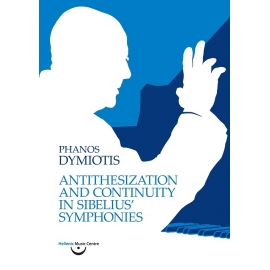No products
Product successfully added to your shopping cart
There are 0 items in your cart. There is 1 item in your cart.
Dymiotis. Phanos
Top sellers
-

Levidou & Vlastos (eds.): Revisiting the Past, Recasting the Present
Levidou, Katerina & Vlastos, George (eds.) Revisiting the Past,...
0,00€ -

Sakallieros: Dimitri Mitropoulos and His Works in the 1920s
Sakallieros, Giorgos Dimitri Mitropoulos and His Works in the 1920s. The...
29,00€ -

-

Perpessas: Christus Symphony
Charilaos Perpessas (1907-1995) Christus Symphony (1948-50) Full Score...
40,00€ -

Xepapadakou & Charkiolakis: “Interspersed with Musical Entertainment”. Music in Greek Salons of the 19th Century
Xepapadakou, Avra & Charkiolakis, Alexandros “Interspersed with...
22,00€ -

Skalkottas: Suite for violin and chamber orchestra - Transcription for violin and piano
Nikos Skalkottas (1904-1949) Suite for violin and chamber orchestra...
20,00€ -

Kalogeropoulos: Epirote Chronicle
Kalogeropoulos, Takis (1946-2009) Epirote Chronicle for woodwind quintet...
30,00€ -

Dymiotis: Antithesization and Continuity in Sibelius’ Symphonies
Dymiotis, Phanos (1965-2007) Antithesization and Continuity in Sibelius’...
20,00€
INFORMATION
Dymiotis. Phanos
Dymiotis, Phanos
Composer and violinist Phanos Dymiotis was born in Nicosia, Cyprus, on 3 April 1965, when the country was in the 5th year of its independence, for the first time since the 12th century A.D. He was the second of the three children of Stella Dymiotou, a literature teacher, and Nikos (d. 1990), an exceptionally talented sculptor,...
Dymiotis, Phanos
Composer and violinist Phanos Dymiotis was born in Nicosia, Cyprus, on 3 April 1965, when the country was in the 5th year of its independence, for the first time since the 12th century A.D. He was the second of the three children of Stella Dymiotou, a literature teacher, and Nikos (d. 1990), an exceptionally talented sculptor, who, according to Stella, “loved classical music and was even more modest than Phanos”.
In that environment, the rare intellectual and musical abilities of Phanos were apparent very early. He attended the primary schools of Agia Marina and, subsequently, Chryseleousa, in Nicosia (1970-1976), and excelled in all subjects, while participating in all the vocal and instrumental ensembles. He played the mandolin, and, at the age of 10, he started violin lessons. He continued his schooling at the “Pankyprio Gymnasio Kykkou”, where music teacher Maro Skordi helped him to enrich his knowledge and distinguish himself, recognizing his progress in the violin as well as the artistry of the works he had already composed, studying from books “in his free time”, as he himself wrote. His composition Marcia Funebre was written in 1977 on the death of Makarios III, one of the world’s most popular leaders, whose funeral was a stirring public event. It is the first of Dymiotis’s works that attest to his constant interest in the unequal struggles and political deadlocks of his country, part of which was invaded by the Turks in 1974.
While still in high school, Dymiotis also composed a String Quartet (1979), which was chosen and performed by a professional ensemble in Sofia, on 20 August 1979, as part of the events for the International Year of the Child. The quartet and Marcia Funebre impressed Philip R. Pfaff, the English examiner in Cyprus of the Royal Schools of Music Associated Board, who, upon the insistence of Maro Skordi, agreed to examine Phanos Dymiotis in the violin and look at his compositions. As a result, Dymiotis completed his secondary education in one of the best music schools of England, Chetham's School of Music in Manchester, which prepares gifted children for Higher Education.
While attending Chetham’s School of Music (1979-1983), he composed ten works, some of which are the work of a mature composer, like the Divertimento for chamber orchestra, and the oratorio The Last Apostle, inspired, too, from Makarios III, parts of which were performed in Nicosia on 19 January 1983. Dymiotis made equally spectacular progress in his violin studies. And, in every phase of his studies, he was also active as an organizer and performer of music.
In Manchester, he formed a deep friendship with Greek pianist, conductor and musicologist George Hadjinikos (1923-2015). Through him, he became acquainted with the work of Nikos Skalkottas (with whom he probably identified to some degree). Hadjinikos also gave him the opportunity to show his performing skills by inviting him to replace at the last moment the soloist of a concert he was conducting, and he impressed both audience and critics in Lalo's Symphonie espagnole.
Being, at the age of 18, an accomplished composer and violinist, he easily got into Cambridge University (Trinity Hall) in 1983, and graduated in 1986, having received the highest distinction, first-class honours for two consecutive years, “a double first class, a most unusual achievement” according to a university certificate. In 1986-87, Dymiotis pursued postgraduate studies (Master of Philosophy) in Musical Composition. His teachers were Robin Holloway and Alexander Goehr (son of Walter Goehr, Schoenberg’s pupil in Berlin and fellow-student of Nikos Skalkottas), with whom Dymiotis had been having lessons since 1984-85.
The last phase of Dymiotis’s studies was in 1987-1993, at Princeton University, U.S.A., where he acquired a doctorate in composition. Thanks to one of the many scholarships that he had received, in 1993 he attended classes in advanced composition at the Aspen Music School, under the director himself, Greek-descended composer George Tsontakis. His participation in a composition contest for the 1992 inauguration of the University of Cyprus renewed his ties with Cypriot musical life. His composition Academic Overture (after Brahms’s Akademische Festouvertüre) won first prize and was performed in Nicosia in October 1993.
Dymiotis’s professional career started with a three-year contract (1995-98) as Lecturer at Goucher College in Baltimore. In 1993-95, awaiting the beginning of the contract, he was in New York, active as a performer and composer. However, as he wished to have plenty of time for composing and performing, he soon abandoned his academic career. From 1998 onward, he lived in Lutherville, outside Baltimore, Maryland, a state on the densely populated East Coast, which afforded him the possibility of collaborating with the musical ensembles of many cities: he was Concertmaster of the Mid-Atlantic Symphony Orchestra at Easton (where he was also Composer-in-Residence); he played in the Annapolis Symphony Orchestra, in the Baltimore Opera, as well as in the Delaware Symphony Orchestra, the New Horizons Chamber Orchestra, and the Mariner String Quartet among others.
His interest in the wide and egalitarian dissemination of music led him to participate in the programme “Performing Arts for Everyone” of the Kennedy Center Millenium Stage, Washington D.C., and to give violin lessons in primary schools.
During that period, he wrote a work for Cyprus, the Hymn to Aphrodite, to Homer’s text, commissioned on the occasion of the accession of Cyprus to the European Union in 2004.
The Mid-Atlantic Symphony Orchestra commissioned Dymiotis to compose a work to be performed along with Stravinsky’s L’histoire du soldat at a concert on 22 March 2007. For this composition, which he named The Soldier's Blues, Dymiotis “borrowed” the orchestration and melodic motifs from Stravinsky’s Soldier. From the Blues he took scales and harmonies. Dymiotis was present at rehearsals of the work. But its premiere was given amid the fresh and tragic sense of an unexpected void caused by his sudden death, on 10 March, in a road accident, returning from a concert of the Delaware Symphony Orchestra in Wilmington.
Katy Romanou
[English translation by Helena Grigorea]
Dymiotis. Phanos There is 1 product.
-
Dymiotis: Antithesization and Continuity... Dymiotis: Antithesization...
Dymiotis, Phanos (1965-2007) Antithesization and Continuity in Sibelius’ Symphonies ISBN: 978-618-80006-5-0 Pages: 144 Price: 20 € Text editing and proofreading: Helena Grigorea Musical examples editing: Yannis Samprovalakis Musical examples design: Phanos Dymiotis Dymiotis, Phanos (1965-2007) Antithesization and Continuity in Sibelius’ Symphonies...
20,00€




